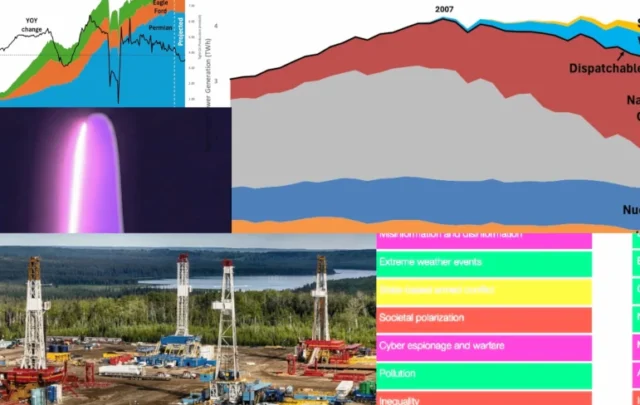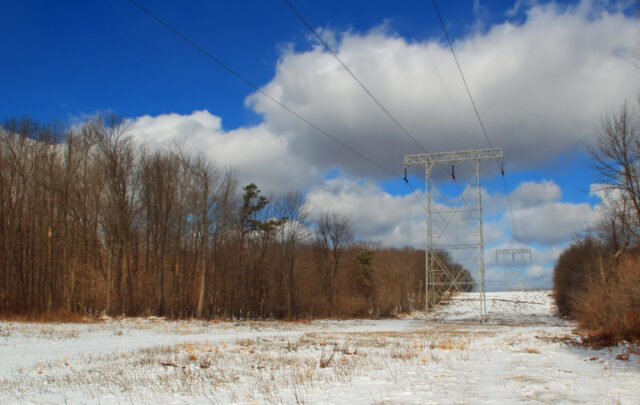Click on the headline (link) for the full text.
Many more articles are available through the Energy Bulletin homepage
The Sum of Some Fears
Paul Krugman, New York Times
Yesterday’s scary ride in the markets wasn’t a full-fledged panic. The interest rate on 10-year U.S. government bonds — a much better indicator than stock prices of what investors think will happen to the economy — fell sharply, but even so, it ended the day higher than its level as recently as mid-May, and well above its levels earlier in the year. This tells us that investors still consider a recession, which would cause the Fed to cut interest rates, fairly unlikely.
So it wasn’t the sum of all fears. But it was the sum of some fears — three, in particular.
The first is fear of bad credit.
… I’ve written less about oil prices, so let me emphasize two points about the oil situation. First, we’re now in our third year of very high oil prices by historical standards – prices as high, even when adjusted for inflation, as those that prevailed in the early 1980s, after the Islamic revolution in Iran. Second, unlike the energy crises of the past, this price surge has happened even though there hasn’t been any major disruption in world oil supply.
It’s pretty clear what’s happening: economic development is colliding with geology.
The “peak oil” theorists may or may not be right in asserting that world oil production is already as high as it will ever go – anyone who really knows what’s going in Saudi Arabia’s fields, please drop me a line – but finding new oil is getting a lot harder. Meanwhile, emerging economies, especially in Asia, are burning ever more oil as they get richer. With demand soaring and supply growth sluggish at best, high prices are what you get.
So why did people seem so shocked by a few more bad housing and oil numbers? What I guess I didn’t realize was how deep the denial still runs.
Over the last couple of years a peculiar conviction emerged among some analysts – mainly, for some reason, among those with right-wing political leanings – that the housing bubble was a myth and that the real bubble was in oil prices.
Each new peak in oil prices was met with declarations that it was all speculation – like the 2005 prediction by Steve Forbes that oil was in a “huge bubble” and that its price would be down to $35 or $40 a barrel within a year. And on the other side, as recently as this January, National Review’s Buzzcharts column declared that we were having a “pop-free” housing slowdown.
…Anyway, now reality is settling in. And there’s one more thing worth mentioning: the economic expansion that began in 2001, while it has been great for corporate profits, has yet to produce any significant gains for ordinary working Americans. And now it looks as if it never will.
(27 July 2007)
Behind a paywall. More complete text of the column
Links and discussion at TOD. They’re sending Paul Krugman email in response to his query: “anyone who really knows what’s going in Saudi Arabia’s fields, please drop me a line”.
Contributor kjmclark writes:
Krugman only rarely misses the mark. This is the first I recall him saying anything about oil in many years of columns. Recall that Paul Krugman is not only a top-notch columnist, but a top-rung economist.
Happiness, economic growth, and oil prices
Stuart Staniford, Stuart Staniford
The country is getting much wealthier over the last few decades has had very limited effect on our aggregate happiness.
Furthermore, oil prices are fairly uncorrelated with happiness: …
Conclusion: The absolute level of happiness of the US population is not very sensitive to macroeconomic variables. The approach of peak oil has not had a large effect on happiness so far. Interesting to watch how this develops.
Finally, I would say that I am “pretty happy”. It would be interesting to know how personal happiness correlates with views on peak oil.
(27 July 2007)
Surprisingly, several peak oilers in the comments section rated themselves as happy or very happy: Leanan, Dan Sailorman… even Matt Savinar (aka “The Chimp Who Can Drive”) of LATOC wrotes: “I’m an uber-doomer and I’d rank my level of happiness as a “7.5” on a scale of 1-to-10.”
I’ve spent the last several years almost exclusively on peak oil and sustainability, and I’d rate myself as “very happy” too. What’s going on here? Does learning about peak oil make you happy?
The idea of happiness being disconnected from affluence is a continual theme in recent work on sustainability, as in Bill McKibben’s recent writings.
Social scientists are studying the phenomenon. For example, see the work of English scholar Avner Offer. -BA
Are We Running On Empty? (Text and video)
Jeff McMullen, ABC (Australia)
The oil age is coming to an end. A growing body of analysts believes we’re driving towards a precipice called “peak oil”, the point at which oil production climaxes and then plunges into irrevocable decline. Some say we’re already there; it’s the Mad Max2 scenario of a world running on empty, where gasoline is the most precious resource on earth, and it’s the end of lifestyles that rely on plentiful oil for cheap transport. How do we quit our addiction to oil? Are modified cars the answer to the coming oil shock? Or should we seriously rethink individual car ownership? Can we get on board mass public transport?
Do we follow the lead of people such as Rupert Murdoch, who recently announced he’s buying a hybrid car that’s driven by a combination of petrol and electric motors? Leonardo DiCaprio also drives a hybrid, and George Clooney has gone a step further, with an all-electric car. Closer to home, Australian of the Year Tim Flannery, Environment Minister Malcolm Turnbull and Opposition Leader Kevin Rudd are converts to hybrids, and thousands more Australians each month are joining them. Difference of Opinion has invited a panel of leading experts to discuss our transport future.
… Links to transcripts of the two segments:
How will cars change as oil runs out?
Can we really build public transport that can effectively replace the car?
(? 26 July 2007)
It’s too bad that a discussion on peak oil skips over the big picture (food production, economic and geopolitical impacts, etc.) and devolves into that most popular of topics: how we can keep on driving our cars. Still, I guess it’s good for getting the idea of peak oil into public discourse. -BA























